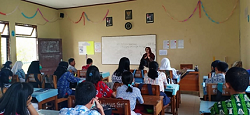Pelatihan Keterampilan Konseling Sebaya dalam Bidang Kesehatan Reproduksi Remaja Peer Counseling Skills Training in Youth Reproductive Health
Main Article Content
Abstract
The great curiosity of adolescents to explore things is often not accompanied by careful consideration so that sometimes the actions are risky for themselves, others, and the surrounding environment. One problem that can arise is reproductive health problems. This training took place at the Muhammadiyah Health Vocational School in Palangkaraya and State High School 1 Palangka Raya with the reason that based on the results of interviews and questionnaires about knowledge of adolescent reproductive health which was still in the low category, no similar training had been carried out at the school. Students at the Vocational School are still teenagers too because they are engaged in health, which will go into the community and can then educate on Adolescent Reproductive Health. Peer groups can be used as a substitute for family, can function to stabilize the influence during the transition as a source of self-esteem, protection from adult coercion. Counselors who use peer counseling services can identify themselves with their peers, and the counselees assume that peer counselors have a willingness to build communication bridges. The results of this activity indicate that there is an increase in the average value of peer counseling skills in the field of adolescent reproductive health. The mean pre-test was 40.8, and the post-test mean was 67.4.
Downloads
Article Details
Authors who publish with this journal agree to the following terms:
- Any article on the copyright is retained by the author(s).
- Author grant the journal, right of first publication with the work simultaneously licensed under a Creative Commons Attribution License that allows others to share work with acknowledgment of the work authors and initial publications in this journal.
- Authors are able to enter into a separate, additional contractual arrangements for non-exclusive distribution of published articles of work (eg, post-institutional repository) or publish it in a book, with acknowledgment of its initial publication in this journal.
- Authors are permitted and encouraged to post their work online (e.g., in institutional repositories or on their websites) prior to and during the submission process, as can lead to productive exchanges, as well as earlier and greater citation of published work.
- The article and any associated published material is distributed under the Creative Commons Attribution-ShareAlike 4.0 International License
References
Astiti, N.M. 2011. Hubungan Faktor Pelatihan Kesehatan Reproduksi dengan Implementasi Pasca Pelatihan pada Konselor Sebaya Kesehatan Reproduksi Remaja di Provinsi Bali. Tesis. Denpasar: Universitas Udayana.
Astuty, S.Y. 2013. Faktor-Faktor Penyebab Terjadinya Perkawinan Usia Muda Dikalangan Remaja Di Desa Tembung Kecamatan Percut Sei Tuan Kabupaten Deli Serdang. Welfare State. 2(1):1-10.
Basuki, A. 2013. Efektivitas Pelayanan Konseling Kelompok Untuk Meningkatkan Keterampilan Komunikasi Interpersonal. Jurnal Penelitian Ilmu Pendidikan. 6(1):46-54. http://dx.doi.org/10.21831/jpipfip.v6i1.4740
Elvianasti, M., Roza, L. 2019. Pembentukan Kader Remaja Sehat Reproduksi di SMA Muhammadiyah 4 Jakarta. JPMB: Jurnal Pemberdayaan Masyarakat Berkarakter. 2(2):109-117.
Erhamwilda. 2015. Konseling Sebaya Alternatif Layanan Bimbingan Konseling di Sekolah. Yogyakarta: Media Akademia.
Filho, E.A.R., Lima, J.C., Neto, J.S.P., Montarroyos, U. 2011. Essential fatty acids for premenstrual syndrome and their effect on prolactin and total cholesterol levels: a randomized, double blind, placebo-controlled study. Reproductive Health. 8:2. https://doi.org/10.1186/1742-4755-8-2
Fitriyani, I.N. 2016. Pengembangan Metode Pelatihan Dengan Problem Card Dalam Peningkatan Pengetahuan Dan Sikap Remaja Tentang Kesehatan Reproduksi. JHE (Journal of Health Education). 1(1):21-25.
Husni, M. 2017. Konseling Sebaya Dalam Islam Untuk Meningkatkan Keterampilan Konseling Sebaya Dengan Mind Skills. Pedagogik: Jurnal Pendidikan. 4(1):47-61.
Kurniawan, L. 2015. Pengembangan Program Layanan Bimbingan Dan Konseling Komprehensif Di SMA. Jurnal Psikologi Pendidikan dan Konseling: Jurnal Kajian Psikologi Pendidikan dan Bimbingan Konseling. 1(1):1-8. https://doi.org/10.26858/jpkk.v1i1.1351
Muslikah, Haryadi, S., Amin, Z. 2016. Pengembangan Model Peer Counseling sebagai Media Pengalaman Praktik Konseling. Indonesian Journal of Guidance and Counseling: Theory and Application. 5(3):48-52.
Purbono, I.A., Prabawati, M., Tarma. 2015. Tingkat Pengetahuan Remaja Tentang Kesehatan Reproduksi. FamilyEdu: Jurnal Pendidikan Kesejahteraan Keluarga. 1(2):135-149.
Rizqi, M.A., Nashori, F., Astuti, Y.D. 2017. Pelatihan Konseling Kesehatan Remaja Untuk Meningkatkan Efikasi Diri Konselor Sebaya Pada Siswa Sekolah Menengah Atas. JIP (Jurnal Intervensi Psikologi). 9(1):64-78. https://doi.org/10.20885/intervensipsikologi.vol9.iss1.art5
Tindal, J.A., Gray, H.D. 2015. Peer Counseling. Indian: Accelerated Development Inc.
